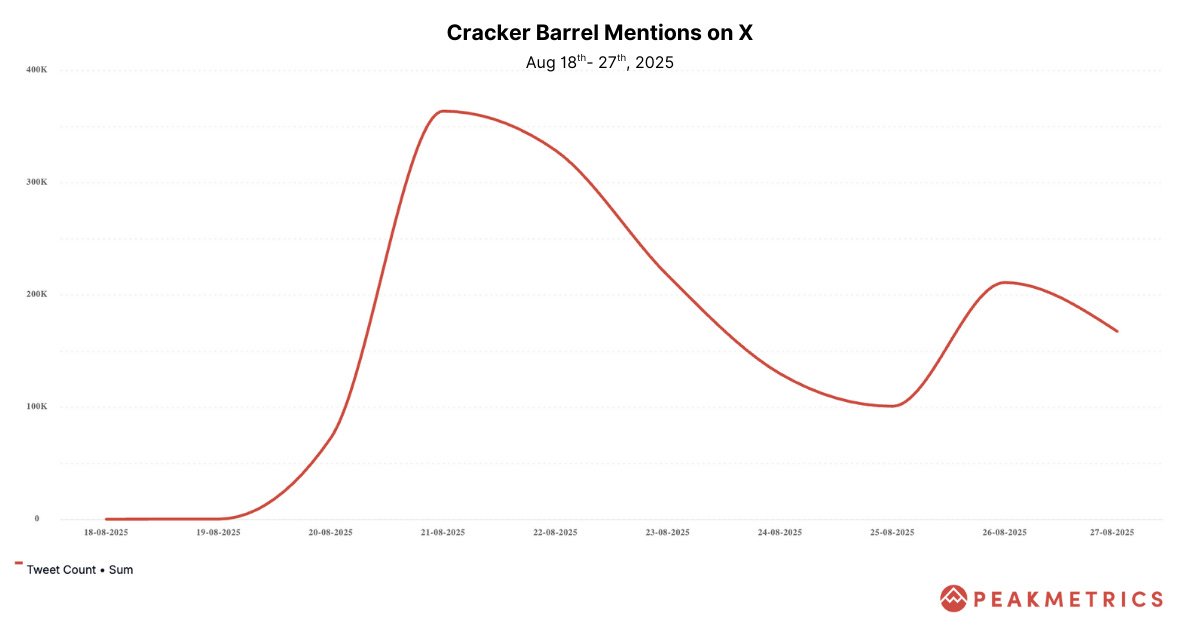Cracker Barrel’s Logo Rebrand Became a Political Firestorm—Here’s What We Found
New today: Why a minimalist rebrand triggered backlash and political pile-ons.
On August 19, Cracker Barrel unveiled a stripped-down, text-only logo as part of its “All the More” modernization campaign. Within days, the redesign spiraled from a routine branding update into a full-blown political flashpoint.
What Happened
PeakMetrics tracked the conversation across X (formerly Twitter) from August 18–27:
Overall mentions of Cracker Barrel surged to 1.58M, compared to just 350 the day before the announcement.
472,000+ posts directly referenced the new logo or rebrand.
423,000+ posts tied the brand to culture-war narratives (“woke,” “anti-woke,” “un-American”).
39,763 posts called for boycotts.
16,855 posts connected the change to “Epstein files” conspiracies.
Even CEO Julie Felss Masino was pulled in—138,000+ posts criticized her as a “woke DEI CEO.”
Politics and Perception Collide
What makes this story bigger than a logo change is how political lean acts as an accelerant.
Cracker Barrel has long been seen as a brand rooted in Americana and nostalgia, with a customer base that traditionally leans conservative. When the company introduced a minimalist redesign, many customers interpreted it not as a creative refresh but as a signal that the brand was “going woke” or abandoning tradition.
This dynamic isn’t unique. Across industries, PeakMetrics has tracked a continuous pattern:
If a brand is seen as conservative: moves toward inclusivity or modernization can trigger accusations of “selling out” or embracing progressive politics.
If a brand is seen as progressive: cutting DEI commitments or shifting messaging can ignite backlash from the left.
The Cracker Barrel controversy underscores how quickly political figures and influencers can seize on these moments. Within hours, voices like President Donald Trump and Charlie Kirk amplified the backlash, while liberal leaders like Governor Gavin Newsom mocked the outrage. What began as a corporate design decision became a proxy battle in the culture wars—reshaping not just reputation but stock price.
The takeaway: branding is never just branding anymore. Companies must understand their perceived political lean and anticipate how changes will be interpreted through that lens.
The Financial Fallout
Cracker Barrel stock dropped 7% in days, wiping out nearly $100M in market value.
Shares briefly rose 4.5% after Trump’s comments, showing how political intervention can sway financial markets.
On August 26, Cracker Barrel abandoned the rebrand and reinstated the old logo.
Why It Matters
This wasn’t just about design. It’s part of a larger trend PeakMetrics is tracking: when a brand’s perceived political lean conflicts with its core audience’s values, backlash is swift, and often amplified by politicians and influencers looking to capitalize.
But in today’s environment, social media supercharges that cycle. A single logo change can become a flashpoint in hours, amplified across platforms, reframed through political narratives, and repackaged into memes, boycotts, and calls to action.
Now, with AI making it easier than ever to fabricate content, coordinate campaigns, and distort reality, these narratives don’t just spread fast, they spread at unprecedented scale.
Our Take
For Cracker Barrel, a logo refresh became a reputational crisis. For every other brand, it’s a reminder that modernization efforts will always be judged through the lens of identity, politics, and speed of amplification.
Leaders must anticipate the narratives their choices will trigger and prepare for how they’ll evolve online. With real-time narrative intelligence, organizations can see the warning signs, measure political lean, and act before an issue spirals.
At PeakMetrics, we help teams defend against this new reality—where social media and AI combine to make every brand decision a potential flashpoint. Request a demo.

